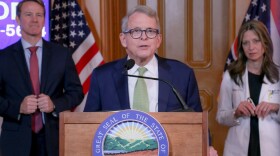A new poll found Ohioans approve of Gov. Mike DeWine’s response to the coronavirus pandemic so far.
Administered by Baldwin Wallace University, the poll looked at attitudes of registered voters ahead of the 2020 election in four Midwestern states: Ohio, Michigan, Pennsylvania and Wisconsin.
Researchers originally aimed to assess attitudes on racism, sexism and environmentalism, said Baldwin Wallace Community Research Institute Assistant Director Lauren Copeland, but pivoted to focus on the coronavirus at the last minute.
“Once the coronavirus became a global pandemic and was having an effect on basically everybody, we decided that the other topics, they weren’t as salient as how this virus is affecting people’s everyday lives,” Copeland said.
The poll asked participants about recent measures taken by both state and federal governments in light of the coronavirus, including the closure of schools and day cares. About 48 percent of the 1,025 Ohioans surveyed said they strongly approve of DeWine’s steps to prevent the spread of COVID-19 overall. About 32 percent say they somewhat approve.
Specific measures also received strong support. The poll found nearly 88 percent of respondents support the governor’s closure of K-12 schools, and 82 percent said they are in favor of the closure of Ohio’s day cares.
Closing restaurants and bars garnered somewhat less support, with almost 77 percent of respondents’ approval.
“I found this a little bit surprising because closing schools and day cares comes at a huge inconvenience to working parents,” Copeland said.
The decision to delay Ohio’s in-person Primary Day voting also received broad support, with about 71 percent approval. The delay caused confusion and received pushback, including a lawsuit from the state Democratic Party.
The poll was administered prior to the stay-at-home order issued by DeWine, Copeland said, and doesn’t include approval ratings for the measure.
“It seems like for the most part people are prioritizing their health and their family’s health over economic concerns,” Copeland said.
Healthcare is now the top issue of concern, according to the poll, and efforts to provide unemployment benefits for those impacted by the crisis saw nearly unanimous support.
The poll found respondents are anxious about the future of the pandemic, with about 68 percent of Ohio respondents saying they believe the worst is yet to come. Roughly 80 percent of respondents said they have changed their daily routine to some extent due to COVID-19.
The virus may have even had an impact on the timeline of the poll, Copeland said. BW initially didn’t plan to release the results until next week.
“The data came in extremely quickly,” Copeland said, “perhaps because people are stuck in their homes.”
The poll also looked at approval ratings for President Donald Trump, and for Sen. Bernie Sanders and former Vice President Joe Biden ahead of the November election.
Trump’s approval rating is about 31 percent among Ohio respondents, and approval for his handling of coronavirus is about 35 percent. But a little more than 30 percent said they believe Biden would handle the crisis better, and about 29 percent said they believe the same of Sanders.
Roughly 60 percent of Ohio respondents say they trust the information Trump gives about the coronavirus at least a good amount.
About 45 percent say they would vote for Trump if the election were held today, versus 43 percent who would vote for the Democratic nominee.
That’s a slight shift from a previous poll released in January, which found Ohio respondents leaning in favor of a Democratic nominee.
“I’m not sure if that’s because we’re seeing a ‘rally around the flag’ effect because of the coronavirus, or it’s because people have more certainty about who they’re going to vote for now that we know who’s likely to be the Democrats’ nominee.”
The numbers fall within the poll’s 3.3 percent margin of error, however.



![Gov. Mike DeWine at a daily news briefing. [Andy Chow / Statehouse News Bureau]](https://npr.brightspotcdn.com/dims4/default/4edd1e8/2147483647/strip/true/crop/980x551+0+0/resize/880x495!/quality/90/?url=http%3A%2F%2Fnpr-brightspot.s3.amazonaws.com%2Flegacy%2Fuploads%2F2020%2F3%2F26%2FMike%20DeWine%20March%2013%202020%20cropped.jpg)



